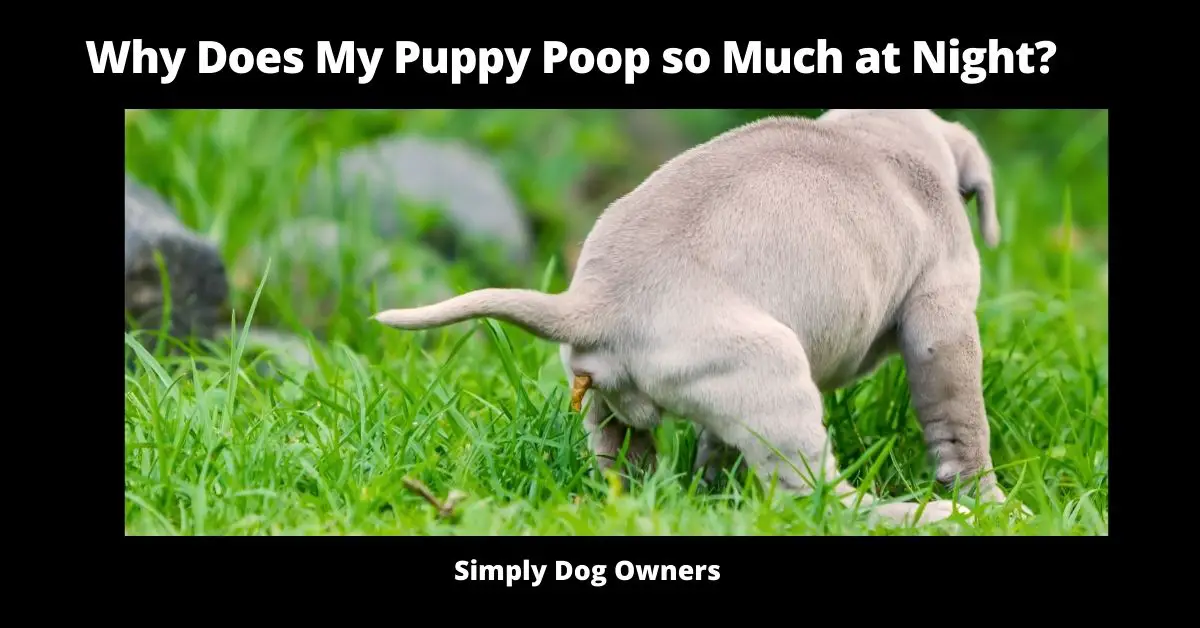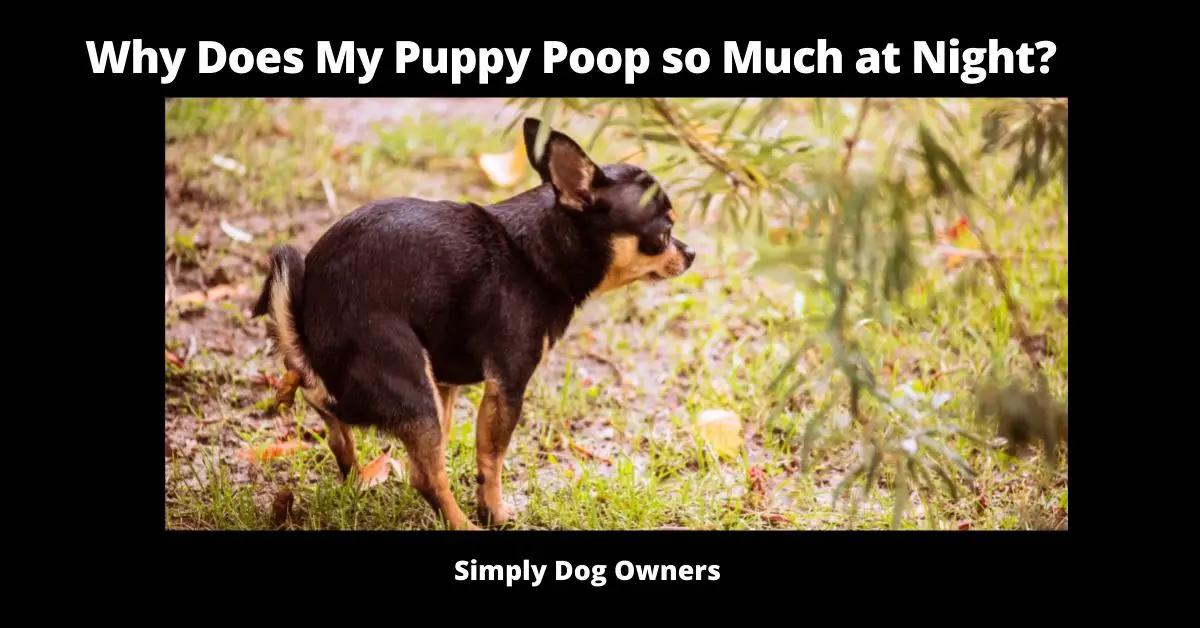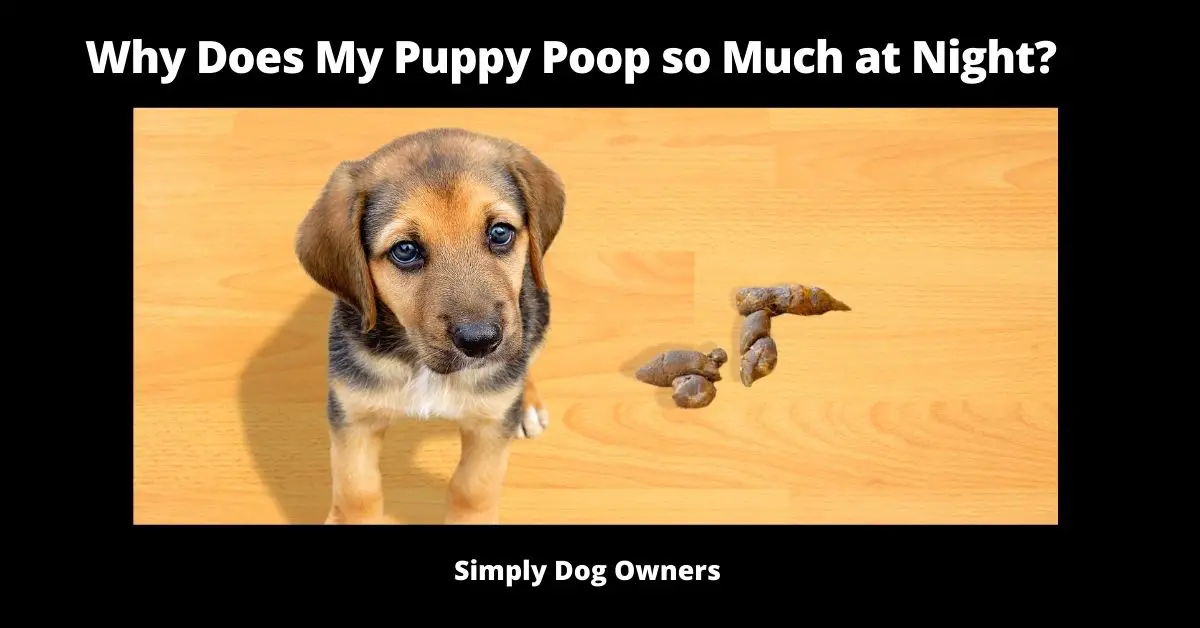A general rule of thumb, puppies will poop after each feeding. Depending on their age the consistency will change.
Why Does My Puppy Poop so Much at Night?
If you’re a new dog owner, you may be wondering why your puppy is pooping so much at night. Puppies typically have to go potty after they eat, drink, and play. And since puppies tend to sleep for 16-18 hours per day, that means a lot of bathroom breaks! If your puppy is waking up in the middle of the night to go to the bathroom, there are a few things you can do to help him or she adjust. In this blog post, we will discuss some tips for housebreaking your puppy during the nighttime hours. Why Does My Puppy Poop so Much at Night?
What are Natural Reasons Puppies Poop so Much?
Some of the natural reasons your pet puppy is pooping a lot can be caused by easily identified Issues:
- Parasites: If your puppy has worms, he will likely have a messy butt and diarrhea.
- Separation anxiety: When puppies are left alone, they may become anxious which can lead to accidents in the house.
- Upset stomach: Puppies can get an upset stomach from eating too much or from eating something they shouldn’t have. If your puppy has diarrhea, this could be the cause.
- Sensitive stomach: Some puppies have sensitive tummies and can’t handle certain foods or changes in diet. If you’ve recently changed your puppy’s food or he’s eaten something new, this could be the cause of his upset stomach and diarrhea.
- Behavioral issues: If your puppy is having accidents in the house for any other reason, it’s likely due to behavioral issues. This could be anything from not wanting to go outside in the cold to being scared of loud noises.
- Middle of the Night: A lot of puppies will need to go potty during the middle of the night. This is because they usually have a full bladder and bowels when they go to sleep, and they usually won’t wake up until their bladder or bowel is full.
- New family member: When a new puppy comes into the home, the older dog may become territorial and start having accidents in the house.
- Loud noises: If your puppy is scared of loud noises, he may start having accidents in the house when there are fireworks or thunderstorms.
- Warning signs: It’s important to be aware of the warning signs that your puppy may have an infection or another health issue. If your puppy has a fever, diarrhea lasting more than two

What Ages do Dogs Poop Change?
From Birth until adult a dog’s poop will change with each life stage.
- Newborn: A newborn puppy’s poop will be black and tarry. This is because they are not yet digesting food properly and the tarry poop is a sign that they are getting enough iron.
- Puppies weaning: As puppies start to wean off of their mother’s milk, their poop will become less tar-like and more soft and mushy.
- Three-month-old pup: By the time your puppy is three months old, his poop should be well-formed and firm.
- Six- Months: At six months old, your puppy’s poop should be much the same as an adult dog’s.
- Adult: An adult dog’s poop will be brown and well-formed.
- Pregnant: A pregnant dog’s poop will become softer and more watery as her pregnancy progresses.
- Neutering / Spaying: After a dog is neutered or spayed, its poop may change in consistency or color. This is because their hormones have been altered and their digestive system may change as a result.
What Should Healthy Puppy Poop Look Like?
Poop can help tell if your puppy is healthy or might have a problem that might need attention. Healthy puppy poop is firm, well-formed, and one color. If your puppy’s poop is soft, has a bad odor, or contains blood or mucous, he may have an infection and you should take him to the veterinarian.
How Often Should Puppy Poop?
Puppies usually need to go potty after they eat, drink, wake up from a nap, or play. How often your puppy needs to go potty will depend on his age, size, and activity level. A good rule of thumb is that puppies should poop at least once a day, but may need to go more often if they are very active.
How Can I Housebreak My Puppy?
There are a number of things you can do to housebreak your puppy. The most important thing is to be consistent and patient.
Make sure your puppy has plenty of opportunities to go potty outside. Take him out on a regular schedule (every two hours, for example) and always take him out after he eats, drinks, or plays.
Choose a word or phrase to use when you take him outside to go potty (such as “go potty” or “do your business”). This will help him associate going potty with the outdoors.
Praise your puppy when he goes potty outside. This will reinforce the behavior you want him to learn.
If your puppy has an accident in the house, clean it up immediately and do not scold him. This will only make him afraid of you and he won’t understand what he did wrong. Just remember to be patient and consistent, and soon your puppy will learn where he should go potty.
What are the Medical Reasons (medical conditions ) That a Puppy Poops so much?
Some of the medical reasons that your puppy is having stool problems are:
- Diet: If your puppy is eating too much, his digestive system will have a hard time keeping up and he may have loose stools.
- Intestinal parasites: Intestinal parasites are one of the most common causes of diarrhea in puppies. These tiny creatures can live in your puppy’s intestines and steal nutrients from his food. They can also cause irritation and inflammation, leading to loose stools.
- Bacterial infections: Bacterial infections can cause diarrhea in puppies. The most common type of bacterial infection is called gastroenteritis, which is an inflammation of the stomach and intestines. This can be caused by eating contaminated food or water or coming into contact with bacteria from another animal.
- Viral infections: Viral infections can also cause diarrhea in puppies. The most common virus that causes diarrhea is the rotavirus, which is a highly contagious virus that affects the stomach and intestines.
- Cancer: Puppies can develop cancer of the intestine, liver, or pancreas, which can cause diarrhea.
- Inflammatory bowel disease: Inflammatory bowel disease is a condition that causes inflammation of the intestines. This can lead to diarrhea, weight loss, and vomiting.
- Urinary tract infection: Urinary tract infections can cause diarrhea because the bacteria from the infection can spread to the intestine and cause inflammation.
- Liver disease: Liver disease can cause diarrhea because the liver is responsible for breaking down toxins in the body. When the liver is not working properly, these toxins can build up in the intestine and cause irritation.
- Gall bladder problems: Gall bladder problems can also cause diarrhea because the bile that is produced by the gall bladder can irritate the intestine.
- Undeveloped digestive tract: Puppies have an undeveloped digestive system, which means that their intestines are not fully matured. This can lead to diarrhea because the intestines are not able to absorb all of the nutrients from the food.
What are the Foods that can cause a Puppy to Poop so Much?
Some of the types and conditions of food that your puppy eats can cause excessive pooping.
- Commercial dog food: Commercial dog foods are designed to make your puppy’s stool firm. If your puppy is eating a lot of this type of food, he may be having diarrhea because his intestines are not used to processing all the fiber.
- Raw food diet: A raw food diet can also cause diarrhea in puppies. This is because the bacteria in the raw meat can cause an infection in the intestines.
- Human food: Human food is not meant for puppies and can cause diarrhea because their digestive systems are not designed to process it.
- Solid food: Solid food can also be hard for puppies to digest and may cause diarrhea.
- Dry food: Dry food is a type of food that is high in fiber and can cause diarrhea if your puppy eats too much of it.
- Sweets: Sweets, such as candy and cake, are not good for puppies because they are high in sugar. Sugar can upset the stomach and lead to diarrhea.
- Chocolate: Chocolate is one of the worst things that you can give your puppy because it is high in sugar and caffeine. Chocolate can cause vomiting and diarrhea.
- Old food: If you are feeding your puppy old food, he may be having diarrhea because the food is no longer fresh.
- Sweet potato: Sweet potatoes are a type of vegetable that can cause diarrhea in puppies if they eat too much of it.
Excessive pooping: If your puppy is constantly having diarrhea, it may be a sign that he is eating something that is not agreeing with him. Try to eliminate one type of food at a time and see if diarrhea goes away. This will help you to determine which food is causing the problem. Consult Your Vet Baby Puppies Can be Very Fragile

How to Remedy Puppy Poop Problems?
What Can You Do to Help Your Puppy Poop Less at Night?
If you’re having trouble getting your puppy to stop pooping so much at night, here are a few tips that may help:
- Make sure your puppy is going potty enough during the day. If he’s not going potty during the day, he’s likely to have accidents at night.
- Take your puppy out for a potty break right before bedtime. This will help him empty his bladder and bowels so that he doesn’t have to go in the middle of the night.
- Invest in a doggy door. If your puppy has access to the outdoors, he can go potty whenever he needs to and you won’t have to worry about him having accidents in the house.
- Use a belly band. A belly band is a piece of cloth that goes around your puppy’s waist and covers his penis. This will help contain any urine that may leak out overnight.
- Make sure your puppy is getting enough exercise. A tired puppy is less likely to have accidents in the house.
- Keep a close eye on your puppy’s diet. Foods that are high in fiber can help make puppies’ poop more solid and easier to control.
- Stool sample – the underlying cause can be found by taking a stool sample in to your vet. He then can check it for any hiding medical issues
- Potty training – may take some time and consistency, but usually works well in the end
- If your puppy is constantly having diarrhea, it may be a sign that he is eating something that is not agreeing with him. Try to eliminate one type of food at a time and see if diarrhea goes away. changes to their diet or potty training
- Positive reinforcement – using treats or toys to reward puppies for going potty in the right spot can be helpful
- Consult Your Vet – if diarrhea persists, it is best to take your puppy to the vet so that they can rule out any underlying medical issues. Puppies can be very fragile and need close monitoring.
- Own room – giving your pup its own safe place to sleep can also help with nighttime accidents. This way, if your puppy does have an accident, it will be in its own space and not in your bed.
- Crate training – some puppies do well with crate training because it gives them a designated space to sleep and limits their access to the rest of the house. This can be helpful if you are not able to keep a close eye on your puppy at all times.
What Dogs are Prone to Poop Problems?
Dogs go through different life stages – at different times they may be more prone to poop problems. These are the most common life stages when dogs have trouble with their poop:
- Adult dogs – Adult dogs may experience occasional diarrhea if they eat something that doesn’t agree with them, or if they are stressed out.
- Older dogs – As dogs get older, their digestive system starts to slow down and they may have more trouble digesting food. This can lead to more frequent diarrhea or constipation.
- Senior dogs – Senior dogs are the most likely to have poop problems because of their age and the changes that happen in their bodies as they age. They may also be taking medication that can cause side effects like diarrhea.
- Dogs with medical problems – Dogs with certain medical conditions, such as diabetes, may also have more frequent or severe diarrhea.
Final Thoughts – Why Does My Puppy Poop so Much at Night?
In Conclusion
Puppies poop a lot. That’s just a fact of life. But if you’re finding that your puppy is pooping too much, or having accidents at night, there are things you can do to help. Talk to your vet about any changes in diet or potty training that might be helpful for your pup, and take steps to make sure your puppy is getting enough exercise and has a clean, comfortable place to sleep. With a little patience and effort, you can help your puppy overcome his poop problems. Thanks for reading!

